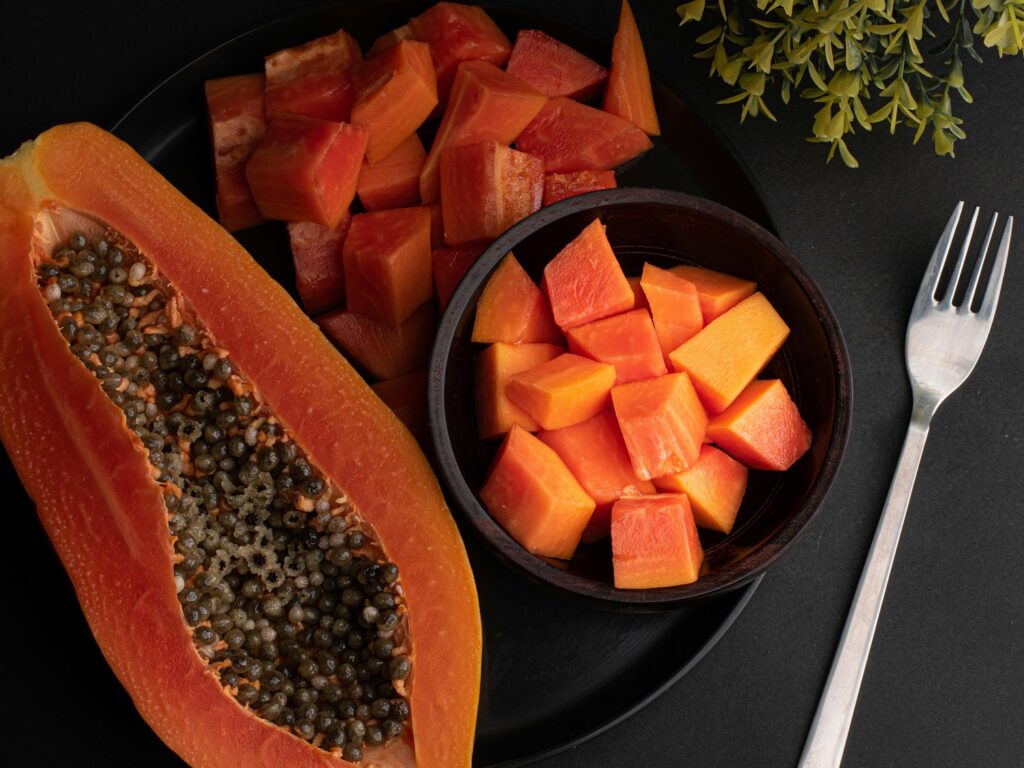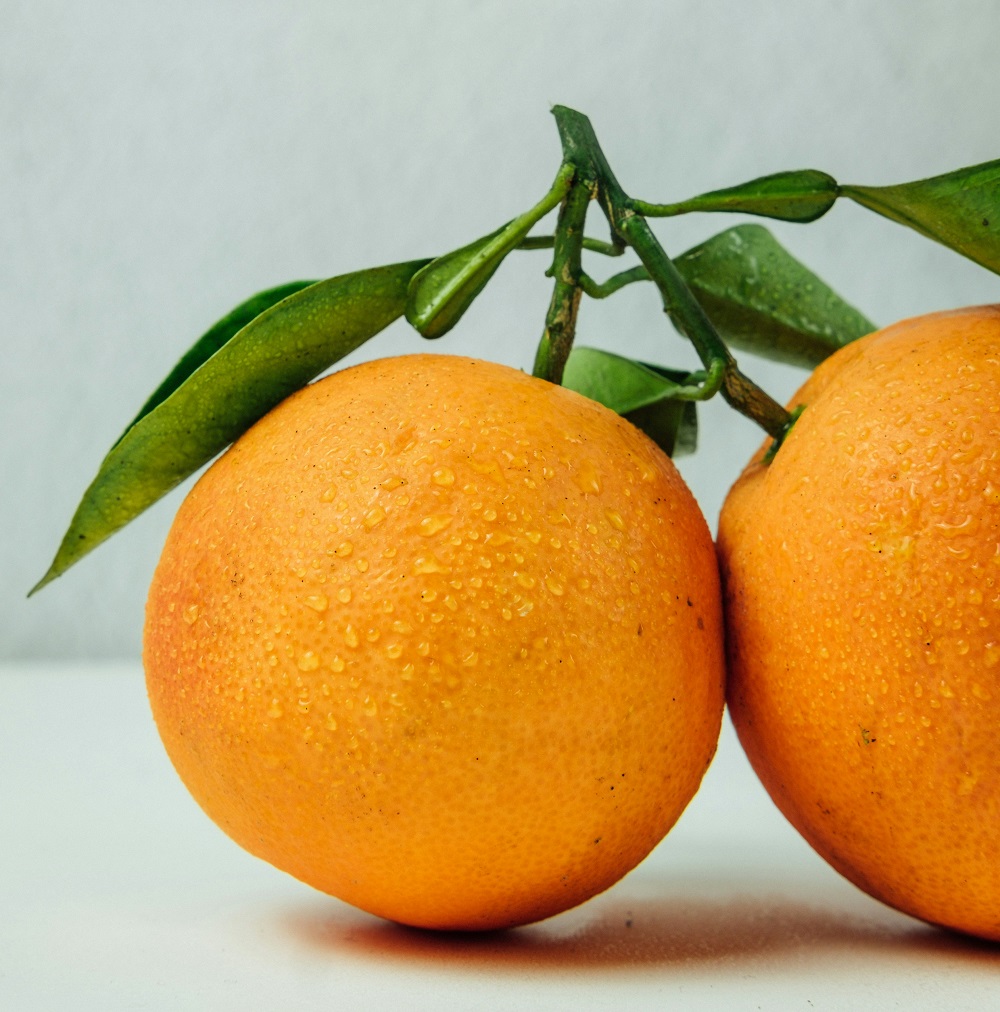When it comes to building muscle, the focus often shifts to protein-rich foods like meats, eggs, and legumes. However, fruits—often overlooked in muscle-building diets—play a crucial role in supporting muscle growth and recovery. They provide essential vitamins, minerals, antioxidants, and natural sugars that aid in reducing inflammation, enhancing digestion, replenishing glycogen stores, and supporting overall health. In this guide, Mohit Tandon from Illinois will explore ten fruits that are particularly beneficial for muscle development. These fruits not only contribute to muscle repair and growth but also offer a plethora of other health benefits, making them valuable additions to any fitness-focused diet.
1. Bananas: The Energizing Powerhouse
Bananas are a staple in many athletes’ diets due to their high carbohydrate content, providing a quick and sustained energy release. They are rich in potassium, an essential mineral that helps prevent muscle cramps and supports proper muscle function. Consuming a banana before or after a workout can replenish glycogen stores and aid in muscle recovery. – Mohit Tandon Illinois
Nutritional Highlights:
- Carbohydrates: Provide quick energy for workouts.
- Potassium: Helps prevent muscle cramps and supports muscle function.
- Vitamin B6: Aids in protein metabolism and cognitive development.
Incorporation Tips:
- Enjoy a banana as a pre-workout snack for an energy boost.
- Add banana slices to your post-workout smoothie to replenish glycogen stores.

2. Guava: The Protein-Rich Tropical Fruit
Guava stands out among fruits for its impressive protein content, offering approximately 2.6 grams per 100 grams. This tropical fruit is also packed with dietary fiber and vitamin C, which play crucial roles in muscle repair and immune function. Incorporating guava into your diet can support muscle growth and overall health.
Nutritional Highlights:
- Protein: Supports muscle repair and growth.
- Fiber: Aids in digestion and maintains gut health.
- Vitamin C: Enhances immune function and collagen production.
Incorporation Tips:
- Enjoy fresh guava slices as a midday snack.
- Blend guava into smoothies for a nutrient-packed drink.

3. Mango: The Vitamin-Packed Energy Booster
Mangoes are not only delicious but also provide a good source of carbohydrates and essential vitamins like A and C. These nutrients aid in muscle repair and growth. Consuming mangoes post-workout can help replenish energy stores and support recovery. – Mohit Tandon Illinois
Nutritional Highlights:
- Carbohydrates: Replenish glycogen stores post-workout.
- Vitamin A: Supports cell growth and repair.
- Vitamin C: Aids in collagen synthesis and immune function.
Incorporation Tips:
- Add mango chunks to your post-workout salad for a refreshing treat.
- Blend mango into smoothies for a tropical flavor boost.

4. Pomegranate: The Antioxidant-Rich Recovery Fruit
Pomegranates are rich in antioxidants, particularly polyphenols, which help reduce inflammation and muscle damage. They also improve blood flow, enhancing nutrient delivery to muscles during recovery. Drinking pomegranate juice after a workout can aid in muscle repair and reduce soreness.
Nutritional Highlights:
- Antioxidants: Reduce inflammation and muscle damage.
- Vitamin C: Supports collagen production and immune function.
- Potassium: Helps prevent muscle cramps and supports muscle function.
Incorporation Tips:
- Drink a glass of fresh pomegranate juice post-workout.
- Sprinkle pomegranate seeds over salads or yogurt for added crunch.

5. Papaya: The Digestive Enzyme Enricher
Papaya contains an enzyme called papain, which aids in protein digestion and reduces muscle soreness. It is also rich in vitamins A and C, which support tissue repair and reduce inflammation. Including papaya in your diet can enhance protein absorption and muscle recovery.
Nutritional Highlights:
- Papain: Aids in protein digestion and reduces muscle soreness.
- Vitamin A: Supports tissue repair and eye health.
- Vitamin C: Reduces inflammation and supports immune function.
Incorporation Tips:
- Enjoy fresh papaya slices as a post-workout snack.
- Blend papaya into smoothies for a tropical flavor boost.

6. Watermelon: The Hydration and Recovery Fruit
Watermelon is packed with water, helping to keep you hydrated during workouts. It contains citrulline, an amino acid that improves blood flow and reduces muscle fatigue. Consuming watermelon post-exercise can aid in hydration and accelerate recovery.
Nutritional Highlights:
- Water Content: Keeps you hydrated during workouts.
- Citrulline: Improves blood flow and reduces muscle fatigue.
- Vitamin C: Supports collagen production and immune function.
Incorporation Tips:
- Enjoy a slice of watermelon post-workout to rehydrate.
- Blend watermelon into smoothies for a refreshing drink.

7. Blueberries: The Antioxidant-Rich Muscle Protector
Blueberries are known for their high antioxidant content, which helps reduce inflammation and muscle damage after workouts. They are also rich in fiber, which aids in digestion and ensures your body absorbs nutrients effectively.
Nutritional Highlights:
- Antioxidants: Reduce inflammation and muscle damage.
- Fiber: Aids in digestion and nutrient absorption.
- Vitamin C: Supports collagen production and immune function.
Incorporation Tips:
- Add a handful of blueberries to your post-workout oatmeal.
- Blend blueberries into smoothies for a nutrient-packed drink.

8. Apples: The Fiber-Filled Recovery Snack
Apples are rich in fiber and vitamin C, which help in muscle repair and recovery. The antioxidants in apples also help in reducing muscle inflammation, making them an excellent food for muscle weakness.
Nutritional Highlights:
- Fiber: Aids in digestion and maintains gut health.
- Vitamin C: Supports tissue repair and immune function.
- Antioxidants: Reduce muscle inflammation and fatigue.
Incorporation Tips:
- Enjoy an apple as a pre-workout snack for sustained energy.
- Slice apples and pair them with almond butter for a post-workout treat.

9. Oranges: The Collagen-Boosting Citrus
Oranges are loaded with vitamin C, which plays a vital role in collagen production. Collagen is a protein that helps maintain strong and flexible muscles. Plus, vitamin C supports faster muscle recovery after an intense workout by reducing inflammation and oxidative stress.
Nutritional Highlights:
- Vitamin C: Supports collagen synthesis and immune function.
- Potassium: Helps prevent muscle cramps and supports muscle function.
- Fiber: Aids in digestion and maintains gut health.
Incorporation Tips:
- Drink a glass of fresh orange juice post-workout to stay hydrated.
- Add orange segments to your salads for a citrusy twist.

10. Avocado: The Healthy Fat Muscle Builder
Avocados are one of the few fruits that provide a rich source of healthy monounsaturated fats. These fats play a crucial role in hormone production—especially testosterone, which is directly involved in muscle growth. Unlike many fruits that are primarily carbohydrate-heavy, avocados offer a unique nutrient profile that helps balance macronutrients in a muscle-building diet.
In addition to fats, avocados are an excellent source of potassium—more so than bananas—which aids in proper muscle function and helps prevent cramps during or after workouts. They also contain fiber, which supports digestive health and nutrient absorption, and vitamins such as B6, which helps with protein metabolism. – Mohit Tandon Illinois
Nutritional Highlights:
- Monounsaturated Fats: Essential for hormone balance and energy.
- Potassium: Supports muscle contractions and prevents cramping.
- Vitamin B6: Aids in protein metabolism and nervous system function.
- Vitamin E: Supports cell regeneration and reduces oxidative damage.
Incorporation Tips:
- Spread avocado on whole grain toast as a pre-workout snack.
- Add sliced avocado to salads, wraps, or rice bowls for a nutrient boost.
- Blend half an avocado into your post-workout smoothie for a creamy texture and added calories.

Conclusion:
In the world of muscle-building, fruits are often sidelined in favor of more “traditional” protein-heavy foods. However, as we’ve explored, fruits can play a vital supporting role in muscle growth, recovery, and overall performance enhancement. Each of the ten fruits discussed—bananas, guava, mangoes, pomegranate, papaya, watermelon, blueberries, apples, oranges, and avocado—contributes in a unique way to the muscle-building process.
Bananas and mangoes provide quick-digesting carbohydrates to refuel energy stores. Guava offers surprisingly high protein content among fruits. Pomegranates and blueberries deliver antioxidants that combat exercise-induced inflammation and oxidative stress. Papaya aids in protein digestion through its enzyme content, and oranges help build collagen necessary for muscle and joint integrity. Apples and watermelon keep the body hydrated and energized, while avocado delivers healthy fats critical for hormone regulation and recovery.
What makes these fruits particularly valuable is their versatility and natural synergy with other whole foods. They can easily be added to shakes, oatmeal, salads, or eaten on their own as snacks. Unlike supplements, fruits offer bioavailable nutrients in their most natural form, along with fiber that supports gut health and nutrient absorption—both essential for effective muscle building.
Additionally, for those who struggle with appetite or digestion during intense training phases, fruits can provide a lighter, more palatable way to consume essential calories and micronutrients. Their hydrating properties also make them indispensable in hot climates or during high-intensity training.
To truly maximize your gains, think beyond protein powders and grilled chicken. Consider the balance and variety that fruits can bring to your diet. Their complex mix of carbs, antioxidants, fiber, and even small amounts of protein creates an ideal environment for muscle repair and growth.
Finally, it’s important to remember that muscle building is about more than just lifting weights or increasing protein intake. It’s about how well your entire body is functioning—your digestion, your recovery, your hormone levels, and your hydration. And that’s where fruits quietly, but powerfully, make their mark.
So the next time you’re planning your meals or prepping for the gym, don’t forget to make room for nature’s sweet, nutrient-dense allies. Whether it’s a bowl of mixed berries, a smoothie with banana and avocado, or a fresh orange with breakfast, these fruits are not just good for your health—they’re essential for your strength.
